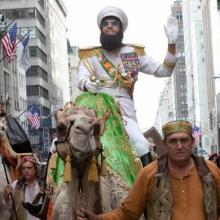director
IN THE 1930s, the Marx Brothers took political satire seriously enough to make a comedy about imperialism. Duck Soup stands today as one of the most comforting movie antidotes to the depressing post-9/11, enemy-until-proven-friend political culture. The 1960s saw Stanley Kubrick upgrade the cinematic presentation of war into Dr. Strangelove: Or How I Learned to Stop Worrying and Love the Bomb—employing the Screwtapian dictum that if the devil cannot bear to be mocked, then the best way to reveal the horror of war is to laugh at it. A decade later, Mel Brooks attacked—and transcended—white supremacy in Blazing Saddles, a film whose coruscating offensiveness is merely a mirror to our own prejudices. Sacha Baron Cohen is the evident successor to the Marxes, Kubrick the comic satirist, and Brooks. (Some of Michael Moore’s work, and both Armando Iannucci’s In the Loop and Chris Morris’ Four Lions, deserve attention in this light too.)
Baron Cohen’s trilogy of fish-out-of-water-in-the-U.S.A. films, Borat, Bruno, and current release The Dictator, taken together, constitute both deliriously funny entertainment (sometimes confused, and with something to offend truly everyone) and a jeremiad against the monstrosities of our time: racism, sexual violence, homophobia, xenophobia—and that’s just for starters. The Dictator has post-9/11 politics, the war on terror, Islamophobia, and anti-Semitism clearly in its sights. Our hero—for that is what he ultimately becomes—is a Middle Eastern tyrant in the Saddam/Gadhafi mold, with a bit of Ahmadinejad and even Kim Jong-Il thrown in for good measure. He gets lost in New York and experiences what life is like outside the palace, leaving behind its personal executioner and other amenities. His path to liberation and respecting others comes through working in a vegan grocery store—not an unrealistic program in the non-cinematic world. What’s remarkable about his transformation is that it comes in response to meeting a broader variety of characters than you’d find at the U.N., and to being mentored in treating sexuality (his own and others’) with more respect.
"There are people who struggle with not being understood; God is not one of them."
~ Donald Miller to Christian Piatt
in 'Blue Like Jazz' - The Sojourners Interview
coming Wednesday on God's Politics
++++++++++++++++++++++++++++++++++++
Earlier this week, our intrepid blogger/reporter/resident-God-Nerd Christian Piatt sat down with the makers of the highly-anticipated film Blue Like Jazz — Donald Miller, director Steve Taylor and Marshall Allman, the actor who portrays protagonist "Don" in the screen adaptation of Miller's best-selling memoir — to talk about faith, film and ... fate. The far-ranging interview covers everything from John Coltrane's "A Love Supreme" and what Miller calls "dangerous theological ideas" to the astounding grace of God and peanut butter cups. Fascinating and funny, the conversation with the hearts and minds behind Blue Like Jazz is a humdinger you won't want to miss.
But because we like you a whole lot , we've prepared a wee taste of what's to come ... inside the blog.
